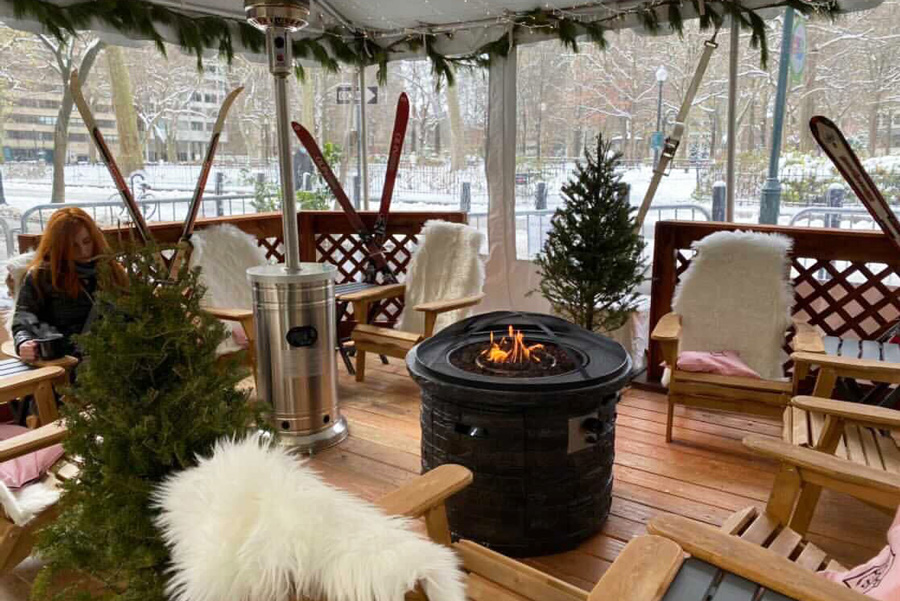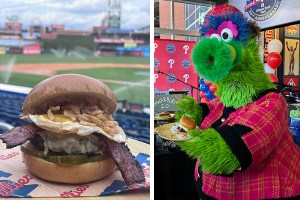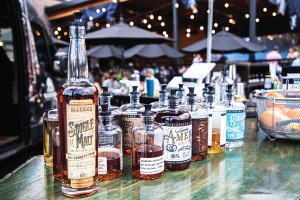Bundle Up, Philly’s Heated Outdoor Dining Regulations Are Changing
Outdoor dining is forever. Many of Philly’s heat lamps are not.

Last year’s outdoor dining set-up at Rouge. / Photograph by Maggie Huth
By now you may have heard that outdoor dining is forever. Pause for applause, boos, and possible crowd surfing on behalf of all the tiny Pomeranians sitting on the sidewalk at Parc. Turns out, though, many of Philly’s existing heat lamps are not forever. At least according to the city’s updated regulations, which prohibits propane tanks and overhead dome heaters in all streetery settings.
Wait, what’s happening? And why?
On October 19th, the city announced the permanent extension of its temporary, COVID-inspired outdoor dining policies. Now, restaurants and bars that wish to operate sidewalk dining areas and/or streeteries (a cute word for any dining structure that lives in a parking lane in front of a restaurant) must apply for new licenses that adhere to updated design and safety regulations, of which there are many. The city is now accepting three types of parking-lane streeteries: enclosed structures, open areas set up directly on the pavement, or open areas set up on a constructed platform.
As for the “why,” the city’s guide for business owners says: “The permanent program carries several goals, with public safety and accessibility being chief among them. The regulations establish a base-level of protection against auto collisions and ensure that emergency access and traffic sight-lines aren’t blocked.” In February of 2022, the city released updated streetery regulations that inspired backlash from many restaurateurs. The latest outdoor regulations are said to have been developed with feedback from restaurant owners, Philly residents, and the “lessons learned by other cities over the past two and a half years in the creation of the permanent Outdoor Dining Program.”
These updated licenses can’t be so much work for restaurants, can they be?
The city says that “Most streeteries that were put into place during the pandemic do not comply with the permanent regulations and require substantial re-design or total removal.”
As was the case in the temporary program, restaurants seeking new licenses for sidewalk cafes and streeteries must be approved by the Streets Department and the Department of Licenses and Inspections — their establishments must also be covered by a $1 million comprehensive general liability insurance policy. (Though, this new set of regulations omits a previous requirement of a $60,000 security bond.)
If a restaurant wants to have a streetery, that business must be located in a “by-right” area of the city (if not, they’ll have to request an ordinance from their city councilperson), then obtain an L&I building permit. If the streetery is enclosed, the business owner will need to get the green light from the city’s Art Commission. Plus, restaurants will pay an $1,750 annual Streetery License fee. For context, the temporary program required a $2,200 annual licensing fee.
Okay, so restaurants can no longer have outdoor heaters?
In a streetery setting, no. Actually, no string lights running between a streetery and a restaurant either, and no externally powered electrical service, for that matter. All electric devices in a streetery must be “powered by batteries or another portable energy source.”
What about sidewalk cafes? Can those areas have heaters?
Propane tanks are fine for sidewalk cafes, as long as the set-up follows fire code restrictions regarding heater placement and storage (restaurants can’t store propane tanks inside, for example). Electric heaters are also kosher for sidewalk dining, as long as they were mounted and installed by an electrician. Additionally, restaurants are not supposed to put heaters under awnings for reasons obvious to anyone familiar with fire generally.
A spokesperson from the Department of Commerce said via email that the city is “not making recommendations on heating sources for outdoor dining because every setup is different. For example, the mushroom style propane heaters are acceptable for sidewalk cafes as long as they are utilized at least three feet from combustible surfaces and the propane tank is properly stored or hauled away at the close of business.”
What does enforcement from the city look like?
According to city code, restaurants that operate illegal sidewalk cafes and streeteries are subject to a fine of up to $300 per day, per violation. Additionally, health department inspectors “can make food businesses cease total operations if their streetery is found unsanitary just like any other part of their establishment.”
When are restaurants supposed to start following these rules?
A spokesperson from the Department of Commerce confirmed that businesses operating streeteries must obtain new licenses by January 9, 2023. Any restaurant seeking to make their sidewalk cafe permanent (or establish a new one) can contact the streets department to start their licensing application before the temporary sidewalk cafe ordinance ends on December 31, 2022.
The city is hosting two info sessions for business owners — one already happened on October 31st and the second will take place on November 21st. Sessions will be held in English, though recorded versions in other languages will be available online. Businesses can call or email the city for direct translation assistance.


